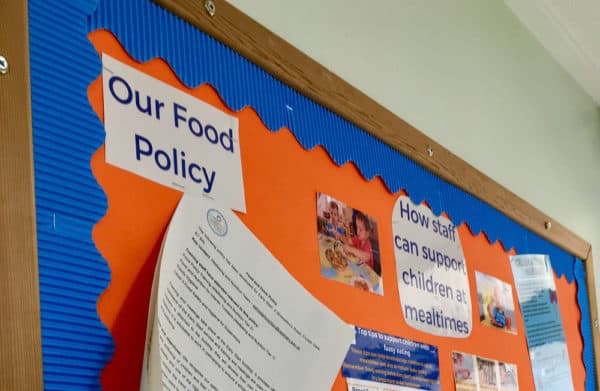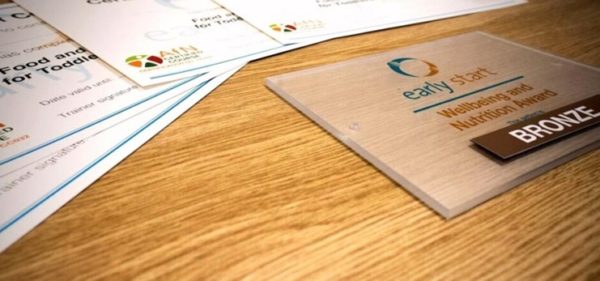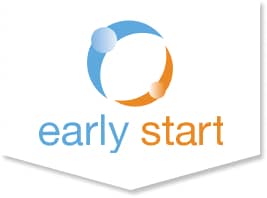Encouraging children to eat well and learn about food early on in life not only protects their health when they’re young, but also sets the foundations for their future health and well-being. Therefore, it’s important to consider the nutrition provision and food culture of any prospective childcare providers for your little one. When visiting settings, you’ll of course have a huge range of questions you’ll want to ask. That’s why, in this month’s blog, we’re providing you with a handy checklist to help you consider what nutrition and food related questions to discuss during your visits.
1. Ask to see their Food and Drink Policy
A setting’s Food Policy should clearly outline their approach to all aspects of food provision and learning about food, and should therefore give you a detailed overview. While the information included within food policies can vary, they should cover the following key topics:
- Overall aim and objectives
- Description of the food and drinks provided at meals and snacks
- The eating environment and social aspects of mealtimes
- Celebrations and special occasions
- How they cater for cultural, religious and special dietary requirements, including managing allergies and intolerances
- Their approach to managing fussy/ picky eating
- Food brought in from home, e.g. lunch boxes and celebrations
- Cooking with children and learning about food
- Food safety and hygiene
- Staff training
- Sustainability
- Protecting children’s health, e.g. promoting and supporting breastfeeding, supporting safe formula feeding, promoting oral health
- Review date of policy and how they collect feedback.

2. Check the settings menu
Early years settings in England are encouraged to follow the Eat Better Start Better (EBSB) Guidelines. These are voluntary food and drink guidelines that support providers to meet the Early Years Foundation Stage welfare requirement for the provision of healthy, balanced and nutritious food and drink.
By following the EBSB guidelines, settings will ensure they:
- Plan all meals and snacks provided to children
- Cover between one to four weeks in their menu cycle and introduce new menu cycles at least twice a year
- Provide children with the nutrition they need to grow, play and learn
- Include a variety of foods, tastes, textures and colours
- Cater for the cultural and dietary needs of all children in their care
- Share menus detailing all meals and snacks with families.
Questions to ask:
- Does your menu meet the Eat Better Start Better Guidelines?
- How often is the menu updated?
- Do staff have training in nutrition to ensure you provide appropriate food and drink?
- Has your menu been checked by a Dietitian or Registered Nutritionist?
3. Consider the mealtime environment
A positive mealtime environment is one that encourages children to learn, develop skills and have an enjoyable eating experience. If possible, during your visit, try to observe a meal or snack time so you can see first-hand how the setting manage mealtimes.

A positive dining environment should:
- Encourage children to help with the set-up and tidy-away of meals and snacks, e.g. setting the tables and clearing away their plates
- Encourage children to self-serve (providing support where necessary), e.g. pour their own water and use serving spoons
- Encourage good table manners and support children to use cutlery, cups, etc.
- Support children’s language and communication, e.g. practitioners should encourage conversations by asking questions such as, “What colours can you see? What is this food called? Is this food crunchy or soft?”
- Support children to learn about food in the context of a balanced diet, e.g. drinking water helps to keep our teeth healthy, milk is good for our bones
- Provide role modelling opportunities where practitioners eat the same foods as the children
- Encourage children to eat to appetite. They should never be coaxed into eating more when they show signs of fullness or refused nutritious puddings/desserts if they do not eat all of their main meal
- Support fussy/picky eaters to try the food on offer. The setting should have an agreed approach to positively manage fussy eating.
4. Ask about their dietary requirements and allergy management policy
It’s a requirement for early years settings to provide a balanced, healthy menu for all children in their care. If your child has a dietary requirement or allergy, then it’s important to ask prospective settings how they will manage this (using guidance from your dietitian or GP).
Questions to ask:
- Do the setting have a detailed care plan template which outlines: foods to avoid, appropriate alternatives, allergic symptoms, medication requirements, how to minimise risk of contact with allergen, etc.
- How are dietary requirements shared with all staff and displayed in the setting? E.g. information displayed in kitchens, in the rooms, on placemats.
- Do the setting ensure regular catch-ups and reviews of children’s dietary requirements?
- How will the setting’s menu be adapted (if necessary) to cater for your child’s dietary requirement/s?
- How do the setting manage cross-contamination risks?
- Is allergen information available on the settings menu?
- Do staff who prepare and serve food have appropriate training, e.g. Food Hygiene?

5. Ask about opportunities to cook and learn about food
When children have frequent experiences of tasting, smelling and learning about a wide variety of foods through cooking and food based activities, they are more likely to develop healthy eating habits that are continued into later life. It is, therefore, a good idea to see what opportunities prospective childcare settings would provide your child to cook and learn about food.
Questions to ask:
- Do you plan regular cooking activities for children where they have the opportunity to cook nutritious recipes?
- Are they able to learn and practice a range of age-appropriate cooking skills?
- Do you provide children with opportunities to learn about food, e.g. trips and visits, growing and gardening, sensory and creative play, songs and books?
- Do you promote health and well-being to children during food based activities, e.g. importance of good oral health, healthy snacks and drinks?
6. And finally, are they part of any award schemes that recognise good nutrition practice?
Some settings choose to work towards an award or scheme to validate their food and nutrition practice.
During your visit, find out if prospective settings have received an award or are currently working towards one; for example, the Healthy Early Years London Award, the Early Start Nutrition Award (opens in new tab) or other local award.

Checklist summary
- Does the setting have a detailed Food and Drink Policy that outlines all aspects of their food provision
- Does their menu meet the Eat Better Start Better voluntary food and drink guidelines?
- How do they create a positive mealtime environment for children?
- How do they manage allergies and special dietary requirements?
- What opportunities do children have to cook and learn about food?
- Are they part of any nutrition schemes or award programmes?
We hope you’ve found this blog helpful and good luck in finding the right childcare setting for your little one 🙂


